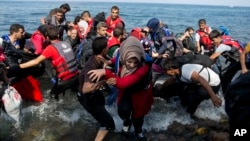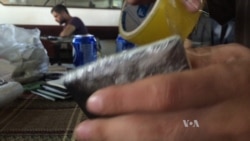The dark hair on Modar’s arms rose visibly when he heard the news. The smuggler had called, and they were getting on a boat.
Some of the seven young men had met only the day before, but they had already formed a group. They looked aghast and excited at the news as they buzzed around each other inside a coffee shop.
“A second is like an hour,” said Modar, waiting for another call to tell him and the others to move.
The men had already wrapped their passports, money and college records in saran wrap, tape and balloons. Phones and chargers were in placed waterproof satchels, and each had a new knife in his pocket for protection.
“Our adventure has started,” said Ahmed, a recent university graduate with an unconvincing smile. If Ahmed returned to Syria, he would be forced to join the army and participate in its gruesome civil war. “We can’t go back; so we have to continue.”
Watch video of men preparing for their ocean voyage
Dangers ahead
Ahmed sold his house to pay for the trip to Europe, regardless of the danger. More than 2,500 people have died in the Mediterranean Sea this year alone.
And when they arrive in Europe, the men will have spent most of their money on the smugglers that got them there, making them more vulnerable to scammers, bad weather and hunger.
They will also cross through countries that have been hostile toward refugees, like Hungary, which is building a fence to keep them out.
“Hungary is a mean country,” said Modar. His friends quietly nodded. After tonight’s sea journey, the country was believed to be the most dangerous part of the trip.
West opening up
The United Nations says 400,000 people fleeing war and extreme poverty are expected to enter Europe this year, with 450,000 following in 2016. The unprecedented flow of people from the Middle East and Africa has forced the continent to dramatically alter immigration policies.
The European Union parliament on Wednesday passed an emergency plan to relocate 40,000 refugees, and many countries have announced large increases in the number of people they intend to take in. Among the wealthier Western countries, Germany has been the most welcoming, saying it can afford to take in 800,000 refugees this year.
"Closing the borders and sending everyone back would mean that we take leave of our most fundamental values as Europeans,” said Frans Timmermans, the vice president of the European Commission. “Opening the borders and letting everyone in would mean that we would put an end to the European social model as we know.”
The United States has been criticized for lack of response to the crisis. On Thursday the United States announced plans to raise its current population of Syrian refugees to 10,000.
In contrast, nearly a quarter of the people in Lebanon are now Syrian refugees, according to the United Nation’s refugee agency.
Anticipation
The seven friends in Turkey had no interest in the United States, deeming it impossible and far away. They talked about universities in Germany, Norway and Sweden, hoping that after their grueling trip, they would emerge with bright futures in refugee-friendly countries.
As they waited, most of the men called their families in Syria to tell them they were getting on a boat. The families began praying. Modar didn’t call because he didn’t want to scare his mother, the thought of whom made him cry. “I just worry for her,” he said.
For two hours they waited, taking selfies and talking rapidly. Their luggage, each with a backpack and garbage bag with a life vest inside, was under the table. They were prepared to throw it all - everything they owned - overboard if their eight-meter rubber boat became unstable.
One man pulled out a cell phone to examine a video everyone in the café packed with refugees has been talking about for two days.
In the video, a Hungarian camerawoman is apparently attacking refugees as they flee. “Look,” said Omar, a 20-year-old college student. “She’s kicking a man with a baby.”
Take off
When the second call finally came, the men grabbed their bags from under the table. They didn’t know where they would be kept while the boat launching site was chosen, how long they would have to wait in the woods while it was inflated, or even which Greek island they were going to.
Some of the men looked worried as they marched down the cobblestone alley to meet their smugglers.
“If something happens to us,” said Omar to a new friend remaining on land, “Can we send you a message on WhatsApp and will you ask the police to rescue us?”

















